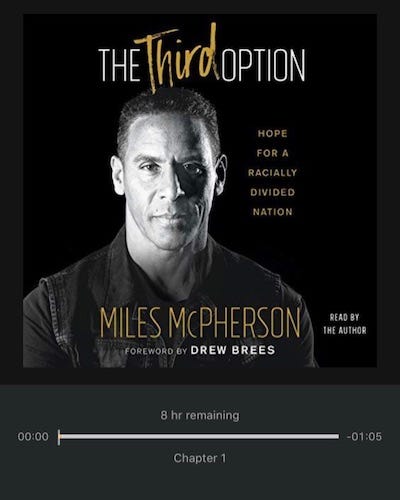The Third Option by Miles McPherson
2020, book 36: “Based on limitations in our physiology, our mind routinely fills in gaps that our eyes don’t see. We also fill in our relational blind spots based on past experiences — good and bad.” — Miles McPherson

Finished on June 1, 2020
After Miles McPherson spoke at Christ Fellowship, I wanted to check out what he had to say on the topic of the race and God’s design. This book was well written and the author did a great job stopping at certain points and providing context, insight, and personal stories.
This is the beginning and the most important truth. We do not know anyone else’s story. Even if they tell us certain things about their lives, we are not aware of their heart state. Why they are who they are today is something beyond our comprehension. It’s not our place to judge and shun anyone. It’s beyond valuable to be considerate and lead with love.
Give honor by acknowledging these truths:
1. Every person has an inalienable right to physical, spiritual, and emotional life.
2. Every person has a right to freely choose their path in life.
3. God has a dream for every person.
“All we know is what we’ve seen in our limited interactions with them.” This is something that I strive to remain cognizant of on a regular basis. There are a wide breadth of experiences that I’ve heard from people. I’ve heard, “you really played football in that area? You shouldn’t even go over there, it’s dangerous.” I never had one issue, everyone was inviting and accepting as I was the same of them. While working at a Cuban restaurant I’ve heard, “I don’t like black customers, they’re rude and don’t tip.” Again, I never had one issue, they were some of the kindest, most considerate customers who also happened to give the best tips. When we hear things like that, we have a choice to make, do we believe that all people working in the restaurant are biased and prejudiced against that group of customers? We could. Or we could encourage them based on the experiences that we’ve had.
So consider it honestly — we’ve all had different life experiences. What are some of the views that you have that others don’t share? Why are they different? Likely, that could come down to an experience that you’ve had or did not have in your life.
Based on limitations in our physiology, our mind routinely fills in gaps that our eyes don’t see. We also fill in our relational blind spots based on past experiences — good and bad. It’s human nature to project what we expect to see rather than rewrite the script we’ve been following all of our lives.
This is especially true when describing people part of our “out group” which is a group we don’t have accurate information about due to our limited exposure of them. As a result we generalize and use stereotypes to fill in the gaps where real knowledge is lacking. Because of our blind spots we often stereotype others assuming a member or a group (such as a racial group other than our own) has certain characteristics without having relevant information about them. All we know is what we’ve seen in our limited interactions with them.
Complete forgiveness. It’s not about showing grace to people, it’s about forgiveness. We don’t want to carry any weight with us, but want to extend forgiveness to others in all ways.
God forgives us completely and gives us the opportunity to be completely reconciled with Him. We have a serious blond spot when we accept complete and quick forgiveness from God but we’re not willing to quickly and completely forgive others. Forgiveness demands that we let go of vengeance and allow God to bring justice in HIS way and in HIS timing.
Forgiveness must also be extended beyond those who have directly hurt us. We may sometimes need to forgive an entire family, community, or race to live in peace.
The outcomes are always up to God. We can do what we can, but God will avenge. Trying to fully control the outcome ourselves undercuts the wisdom and omniscience that God has.
Life isn’t fair and forgiveness isn’t fair. Everything in life will not be fair because we are all flawed. It’s our job to do our part and leave the outcomes to God.
I love this. These are important, specific, and honest. There are always opportunities to do better than we did yesterday and to become more generous, forgiving, better.
7 keys to encourage and embolden honest conversation about race:
1. Acknowledge the reality that you’ll always have a race conversation in your head.
2. The race conversation in your head will not stay there.
3. Honor others by allowing yourself to self-disclose.
4. Take every opportunity to enlighten.
5. Practice by just having a conversation.
6. Set clear boundaries (assume someone’s actions are based on ignorance or fear — not hatred).
7. Start in familiar environments.
Miles is the type of person that I always love to learn from. He’s accomplished, overcame great adversity, strives to lead with love and grace, and is grounded in the Bible.
I gave this book a 3.5/5
Join my weekly newsletter to see all of my writing here.